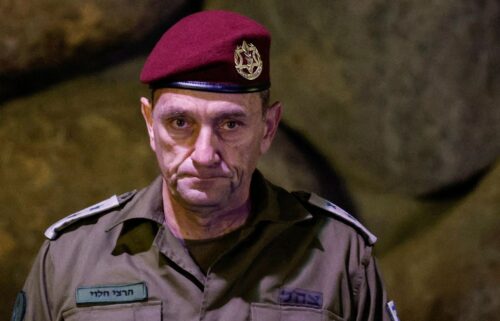More than 130 Israeli reservists sign letter refusing to fight in Gaza and Lebanon
By Zeena Saifi, CNN
(CNN) — When Hamas attacked southern Israel on October 7 last year, reservist Yotam Vilk wasn’t called up for military service – he volunteered to go and fight. Since then, he has spent more than 230 days serving with the Israeli military in Gaza.
It has affected every part of his life. And now, he is refusing to serve again.
“On October 7, I didn’t hesitate… because my people were murdered and killed and I understood that there was a need to save them, and there is still a need to save them, which the Israeli government doesn’t seem to see as urgent,” he told CNN in a phone interview.
After completing his second round of reserve duty in Gaza this summer, he decided he would refuse to go back if he were asked. He believed military action was justified in some cases, but that it should only be used as a tool to reach diplomatic solutions that work towards peace.
He didn’t believe in the government’s will to achieve that, despite “the destruction in Gaza getting harder, the lives of Palestinians getting harder and the lives of Israeli hostages getting harder.”
On October 9, Vilk, along with more than 130 other Israeli reservists, signed an open letter to Prime Minister Benjamin Netanyahu and Defense Minister Yoav Gallant stating that they refuse to serve unless a deal is signed to end the war and bring back the 101 hostages still in Gaza.
‘For some of us, the red line has already been crossed, and for others, it is rapidly approaching: the day when, with broken hearts, we will stop reporting for service,’ the letter read.
Vilk’s “red line” had been crossed, but it wasn’t an easy decision to make.
On the one hand, by refusing to serve, he felt he would be abandoning the hostages and leaving Hamas in charge in Gaza, something he believes makes Palestinians’ lives worse.
On the other, by not refusing, he feared he’d be serving in a war that would end in another Israeli occupation of Gaza, of which he didn’t want to be a part.
Despite Netanyahu stating there would be no resettlement in Gaza, Vilk said the government’s support for the expansion of settlements in the occupied West Bank made him doubtful of his intentions. Netanyahu’s cabinet includes far-right ministers who have called for Israeli settlements in Gaza.
“They put me in a horrible position… I feel betrayed by my own government,” he said.
And he isn’t alone.
Max Kresch served on Israel’s border with Lebanon for 66 days after October 7. Hostilities in the border region intensified as the Lebanese militant group Hezbollah vowed support for Hamas in Gaza. Now, Kresch says he’s had enough. When he returned to his home in Jerusalem at the end of December, he says he had a hard time readjusting and fell into a deep depression.
Serving was very difficult for him, Kresch said, because the atmosphere felt very “religiously militaristic.”
“A very significant portion of the people that I was with felt religiously inspired to be fighting in this war, which was extremely uncomfortable for me,” he said.
He recalled one soldier telling him he believed it was a mitzvah, or Jewish religious duty, to kill Palestinians in Gaza, including children, “because they would grow up to be terrorists.”
Israel’s far-right National Security Minister Itamar Ben Gvir has voiced similar sentiments. Kresch said he finds it “terrifying” that Ben Gvir has a significant voice in the country that resonates with a lot of people.
Despite some comrades holding extreme views that were “very difficult to hear and tolerate,” Kresch believed they were good people, making the choice he made very difficult – and lonely.
By signing the letter, he isn’t trying to discourage others from serving he said, but to support those who have already decided not to.
Fears over ‘forever war’
Kresch’s concerns came to a head as Israel marked a year since the October 7 attack, a milestone he saw as the straw that broke the camel’s back.
“We’re a year in, and we still haven’t had a hostage deal… but doing a deal isn’t going to mean I’m OK and suddenly ready to go back. The camel’s back is broken. It takes a lot more to heal that back,” he said.
Another 28-year-old reservist, who asked to remain anonymous because he didn’t want the families of soldiers who died to feel betrayed by his decision to refuse, served in Gaza for over 130 days. He felt the weight of the anniversary as well.
“The military pressure has been overwhelming for a bit more than a year now, and I don’t think any more military action is going to change the situation,” he told CNN.
Like Kresch and Vilk, he believed it was necessary to fight Hamas on October 7, but to what end?
“We can always keep bombing Gaza… I won’t even talk about the civilian cost, because people in Israel shut down when we talk about it. But the utilitarian cost. There’s no point in fighting a war that could last forever,” he said.
The “forever war” has become a slogan used by opponents of Netanyahu to describe what they believe is his desire to keep it going for his own political gains. Netanyahu has vowed that Israel will “continue to fight” until its enemies are defeated, the hostages are returned, and Israelis can go back to their homes in the south and north.
Last month, Israeli forces invaded southern Lebanon to begin the “next phase” of the war against Hezbollah.
The 28-year-old reservist is from a town in northern Israel that has been hit by Hezbollah rockets over the past year. He feels strongly that Israel needs to go after the Iran-backed Lebanese militant group, but fears it takes the focus away from Gaza and bringing back the hostages.
Kresch, who served on the border last year, believed at the time Hezbollah was a threat that needed to be deterred. But now, he thinks Netanyahu has “leveraged” Israel’s collective trauma “for political gain.”
‘No place for refusals’
This isn’t the first time since the Hamas attacks that reservists have declared their refusal to serve. Back in May, more than 40 reservists signed a letter after Israeli forces invaded the southern Gazan city of Rafah.
But for this new letter, that number has more than doubled, and the stakes are much higher as Israel wages war on multiple fronts.
Transportation Minister Miri Regev, speaking to Kann News, called for those who signed it to be detained.
“There is no place for refusals in the army. Not from the right and not from the left,” she said.
A few days after the letter was published, Kresch told CNN he received a call from the officer responsible for calling up reservists in his unit. The officer asked him to take back what he’d said or vowed not to call him back to reserves, Kresch said.
“It was kind of a ‘you’re not breaking up with me, I’m breaking up with you’ conversation, with a hint of ‘we can still fix this,’” Kresch recalled.
“I said I stand by what I signed… as far as I’m concerned, this cannot be fixed under Netanyahu and whoever comes in afterwards will have a lot of work to do in repairing the broken trust,” Kresch said.
Vilk says he received a call from his brigade commander a week after the letter was published, threatening to remove him from his position.
He served as a deputy company commander in Gaza, and despite refusing to serve, still holds that position. Vilk said the brigade commander claimed he was not allowed to speak against the government, because it was a violation of army orders.
“I still don’t know how it will unfold,” Vilk told CNN, adding that he wasn’t concerned about repercussions.
“I’m more concerned about my moral decisions and my well-being and my ability to look back and believe that I made the right choices and that I was on the right side of history,” he said.
The 28-year-old reservist said he feels the same way. He wasn’t expecting the letter to gain momentum, and only hoped that it would do good.
“My conflict is not at all with people who choose to go… it’s about following orders when it helps our country and when it helps us save lives, and not following orders when we don’t need to because they’re harmful and dangerous,” he said.
“War is a bad thing. We should try to make it as short as possible. And right now, it seems like war has become the target for our leaders, it is not serving any purpose, it is the purpose itself.”
The-CNN-Wire
™ & © 2024 Cable News Network, Inc., a Warner Bros. Discovery Company. All rights reserved.


